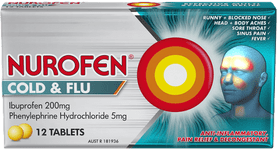1. Cold weather can give you a cold
FALSE: This is a common cold and flu myth. The cold and flu season coincides with cold weather so people often think getting cold or being caught out in the rain can give you a cold. This is absolutely not true. The only way to catch colds and flu is by coming into contact with the virus that causes it. Colds and flus are more common during cold weather because we tend to spend more time indoors and in close contact with other people. This makes it easier for the virus to spread from person to person with people sneezing and coughing in an enclosed space. So having wet hair or going outside and enjoying some fresh air during cold weather won’t give you a cold – just don’t get so wet and cold that you get hypothermia!
2. Having ‘the flu’ is like having a heavy cold
FALSE: While it's true that cold and flu symptoms, like coughing, a blocked nose or headaches, can seem the same, or at least be very similar, they are two very different illnesses. In general, flu symptoms tend to be more severe and last longer. If you or someone in your family is experiencing severe or persistent cold and flu symptoms, or you are worried about the symptoms, always check with a doctor. Heavy colds and flu can lead to complications which make it far more serious, for example with the very young and the elderly. So, this one is definitely a cold and flu myth.
3. It’s just a cold, so it’s okay to go to work or school
FALSE: It’s important to limit contact with other people when you are sick, even if it’s “just a cold”. Colds and flu can spread if you’re in close contact with others. This is especially true for schools and daycares as children’s immune systems are not fully developed and they may not have careful hygiene. Even when you might feel like you are getting over your cold, you can still pass it on to other people around you. The contagious phase of a cold can last for as long as two . Viruses can be very serious for some people, such as young children, older people or pregnant women. Stay home to keep from infecting others.
4. Feed a cold, starve a fever
FALSE: This is a common cold myth that you may have heard of. There is no need to starve a fever or a cold for that matter. When you have colds and flu, you need more fluids to keep you hydrated. You may lose your appetite when you are unwell, but there's little reason to increase or decrease how much you eat. Poor nutrition will not help you get better any sooner.
5. Antibiotics can cure a cold or flu
FALSE: Antibiotics only work against bacterial infections, so they won’t help the symptoms of cold and flu since cold and flu are viral infections. Antibiotics also won’t stop you from spreading your cold or flu to other people. Sometimes people can develop a bacterial infection after getting a cold, so a doctor may prescribe antibiotics to treat the bacterial infection if it doesn’t go away on its own. But antibiotics aren’t used to treat the cold or flu virus directly.
We hope that clears up a few of the common cold and flu "myths" but if you are ever in any doubt about what to do about colds and flu or your symptoms, always speak to your healthcare professional.
RB-M-99310
RB-M-04378






